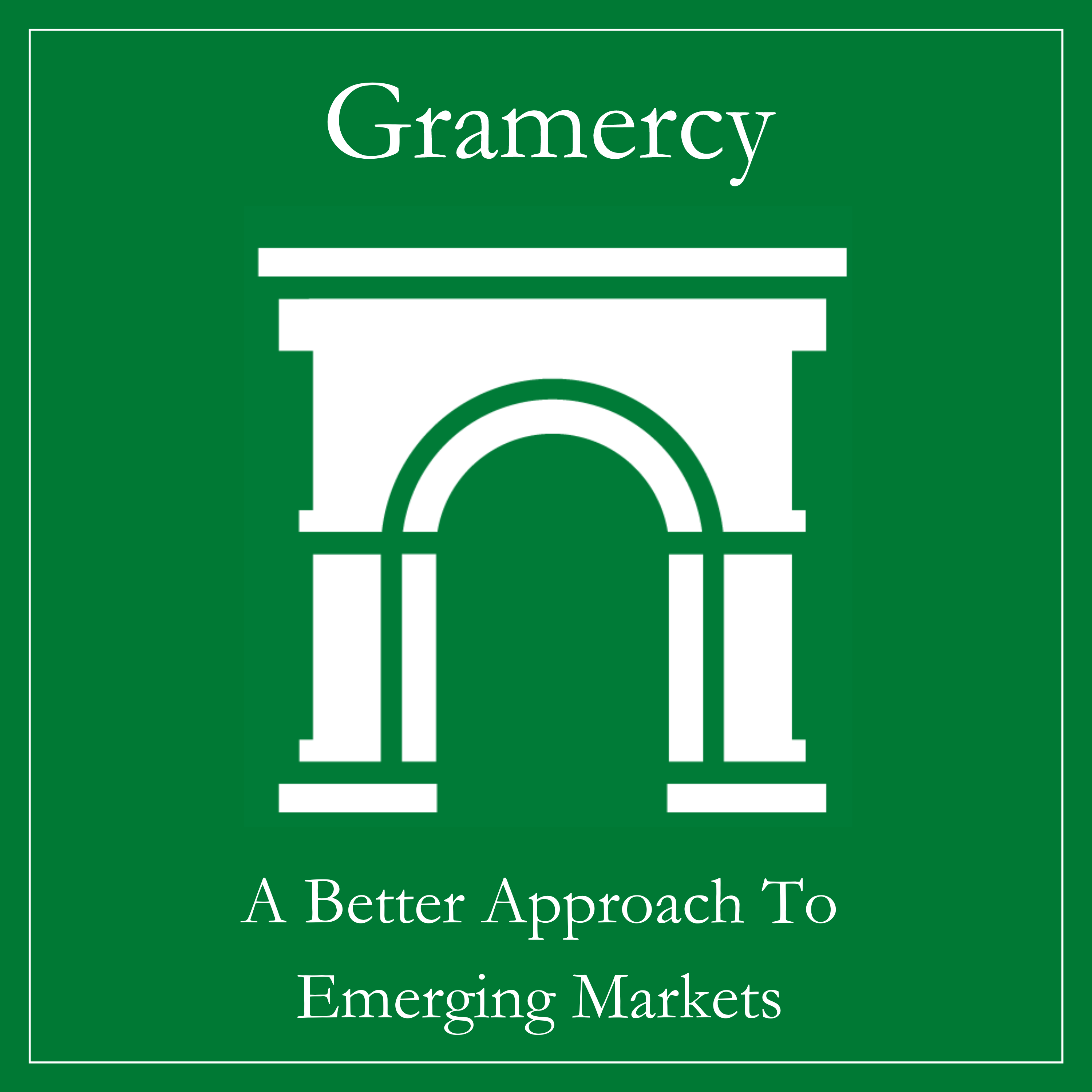Contents
Market Overview
Macro Review
The surprise downside in U.S. inflation breathes life into an interest rate cut at the September FOMC. Signs of data weakening have become stronger, even with a hotter PPI reading. The caveat was Chair Powell’s statement from the Senate Banking Committee that “elevated inflation is not the only risk we face”. The narrative around 2Q earnings also supports this picture. Nevertheless, there is an intensifying chorus of Democrats calling for President Biden’s re-think on his candidacy, which adds a new dimension to political risk management. The major events in EM include the recovery in the Brazilian real, just as UBS raised its inflation forecast to 3.5% from 3.3% after the FX depreciation. It is also becoming more likely that the Chilean Central Bank may no longer cut interest rates by as much as was previously anticipated, which has supported the peso. However, just as the focus on strength in EMFX returns, it does appear that the Bank of Japan were intervening in JPY, which could have triggered USD weakness. Elsewhere, the Kenyan Cabinet reshuffle after Egypt’s reshuffle in the previous week, after the sovereign was downgraded to Caa1 by Moody’s. Finally, escalating tensions in the Middle East rose after a failed ceasefire agreement.
EM Credit Update
Emerging market sovereign credit (cash bonds) ended the week up +1.0% with credit spreads 7bps tighter. Sovereign outperformers were Ukraine, Suriname and Iraq, while Sri Lanka, Argentina and Bolivia underperformed. Monthly seasonal data still points to July being the best returns for U.S. equities (S&P 500) and EM sovereign credit (EMBI Global Diversified). Saudi Aramco issued $6bn across three tranches this week. Some participants highlighted how this is the first time that the company had issued debt since 2021, yet the Saudi Arabian government had issued $17bn this year, just as the wealth fund (PIF) issued $7bn in debt and Aramco issued $11bn of stock. This goes some way to limiting perceived “scarcity value”, especially in an environment where crude oil averaged $83.50/bbl this year.
The Week Ahead
The focus next week is squarely on President Biden’s NBC interview after several gaffes in his NATO speech. Donald Trump is also expected to announce his VP candidate at the Republican National Convention. One of the key fixtures is also China’s Third Plenum of the 20th Central Committee. The once-in-five-years Third Plenum will set the long-term economic and reform agenda, while the quarterly Politburo meeting at the end of July could provide more stimulus. After the ECB cut interest rates by 25bps in June, there is an increasing likelihood that policy rates will remain unchanged next week. Other key interest rate changes include China’s MLF rate (2.5%), Egypt (27.25%), Indonesia (6.25%), South Africa (8.25%) and Uruguay (8.5%). Finally, we expect some focus on the British King’s legislative program under a new Labour Government, just as 2Q corporate earnings kick off in earnest.
Highlights from emerging markets discussed below: President Ruto implements complete reshuffle of Kenya’s Cabinet and China initial June high frequency prints point to more of the same.
Fixed Income
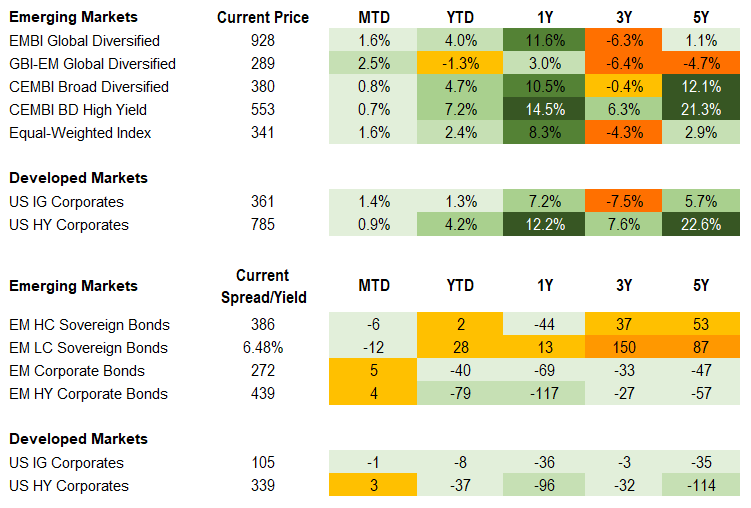
Equities
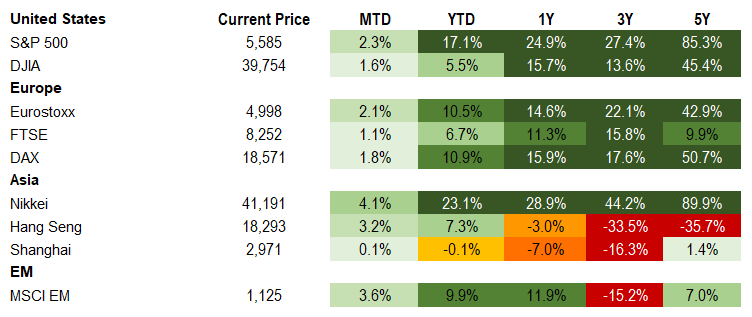
Commodities

Source for data tables: Bloomberg, JPMorgan, Gramercy. EM Fixed Income is represented by the following JPMorgan Indicies: EMBI Global, GBI-EM Global Diversified, CEMBI Broad Diversified and CEMBI Broad High Yield. DM Fixed Income is represented by the JPMorgan JULI Total Return Index and Domestic High Yield Index. Fixed Income, Equity and Commodity data is as of July 12, 2024 (early-afternoon).
Emerging Markets Weekly Highlights
President Ruto implements complete reshuffle of Kenya’s Cabinet
Event: Kenya’s President William Ruto announced in a televised address to the nation that he is dismissing with immediate effect all his Cabinet Ministers except for two, and inviting all political parties to negotiate the formation of a “broad-based” government of national unity.
Gramercy Commentary: The President’s move comes on the heels of deadly protests against proposed tax increases that forced Ruto to withdraw revenue raising measures pre-agreed with the IMF in exchange for financial support. Unlike previous government reshuffles under Ruto that have largely been seen as symbolic and doing little to tackle corruption and/or poor performance by Ministers, the current dramatic dismissal of the entire Cabinet is clearly an attempt by the President to appease the public and signal that he is committed to “change”, a key demand of the anti-government protests. To the extent Ruto’s actions are successful in restoring political and social stability, that will be credit-positive for Kenyan assets that have been under significant pressure lately. However, investors will be looking for compelling signs that the President is able to restore some of his lost political capital by adding credible technocratic names to the new Cabinet. The formation of a broad-based coalition with opposition participation could also be a constructive development from a market perspective, as long as it does not lead to the dilution of the reform agenda/momentum under the IMF program, the main investor confidence anchor for Kenya.
China initial June high frequency prints point to more of the same
Event: June PMI composite data softened moderately with a drop in services and continued divergence between Caixin and NBS manufacturing indices with the latter more export oriented and remaining in expansionary territory. PPI deflation persisted (-0.2% y/y) while CPI missed expectations (0.2% m/m vs. 0.4% consensus). Earlier in the week, the PBoC announced temporary overnight repo and reverse repo operations to “improve the accuracy and effectiveness of open market operations”.
Gramercy Commentary: We see the continuation of mixed economic data as providing little incentive for material near term changes in approach to stimulus policy. Next week, focus will be paid to the Third Plenum but it is not usually a forum for stimulus announcements or detailed policy proposals. The event could begin to set expectations about structural reform that has lagged with respect to evolution of the economy away from investment towards consumption, and address overcapacity issues which have contributed to deflationary pressures. With respect to the recent PBoC repo operations, we see this as linked to Governor Pan’s comments regarding efforts to narrow and enhance functioning of the interest rate corridor rather than any policy shift.
Emerging Markets Technicals
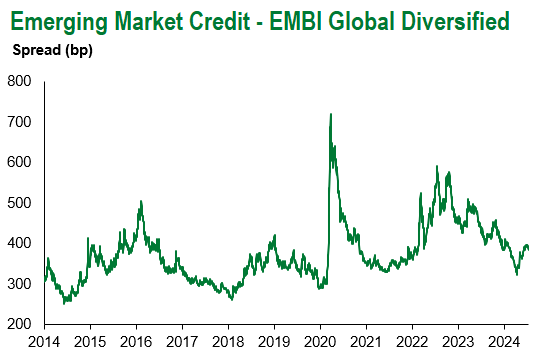
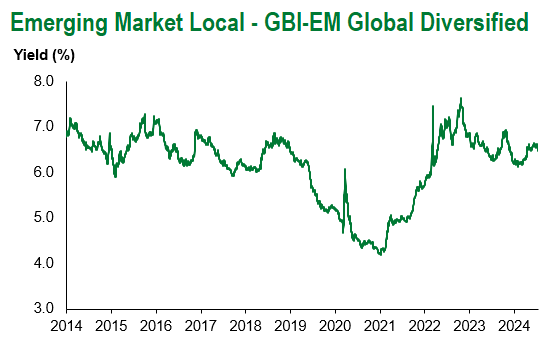
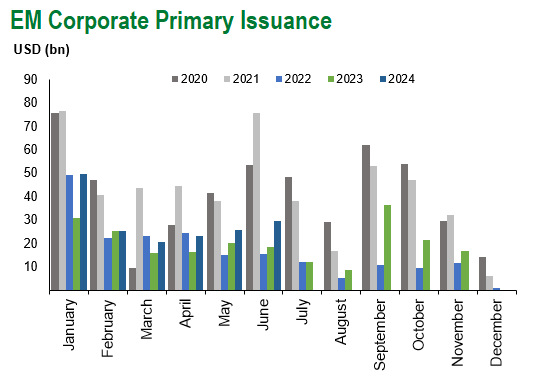
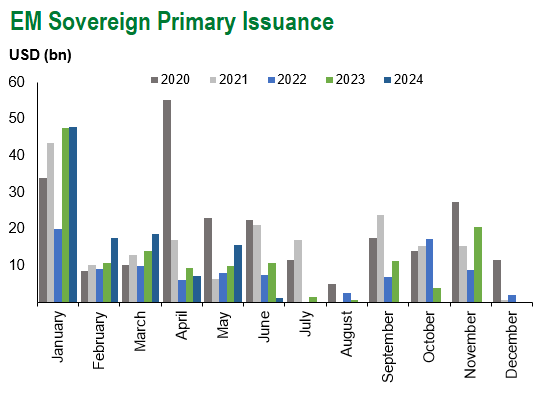
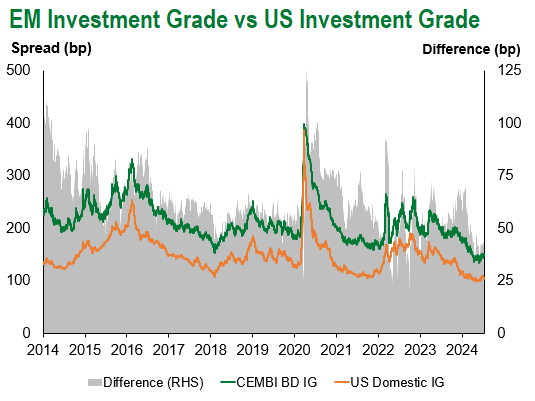
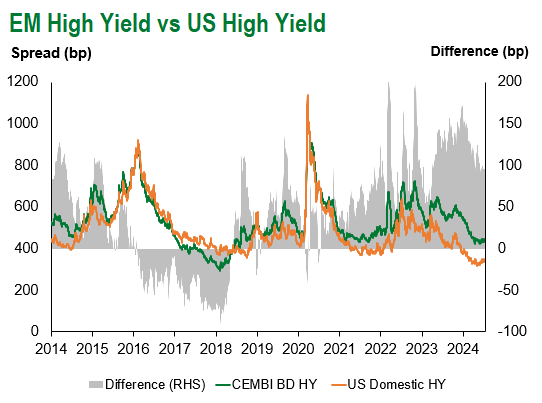
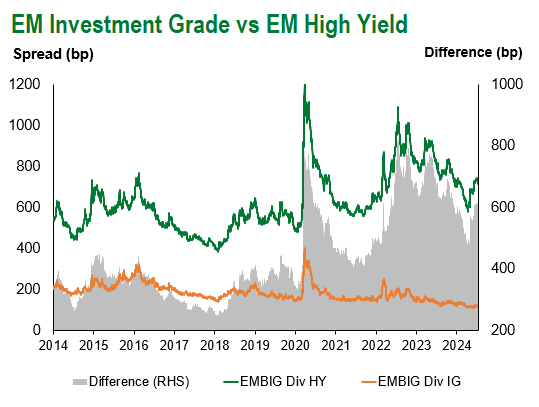
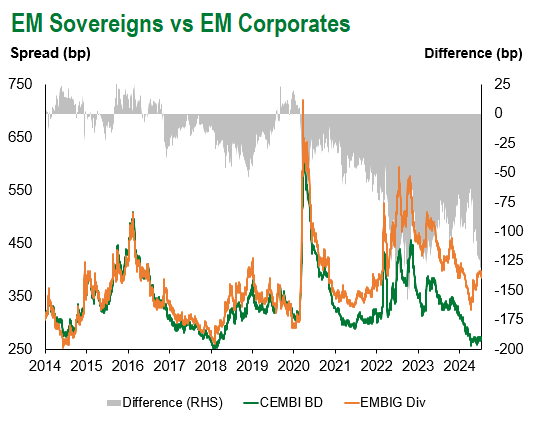
Emerging Markets Flows
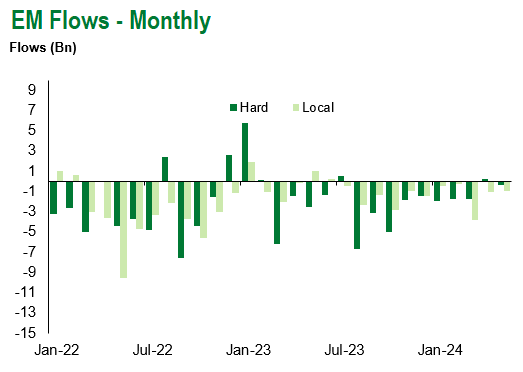
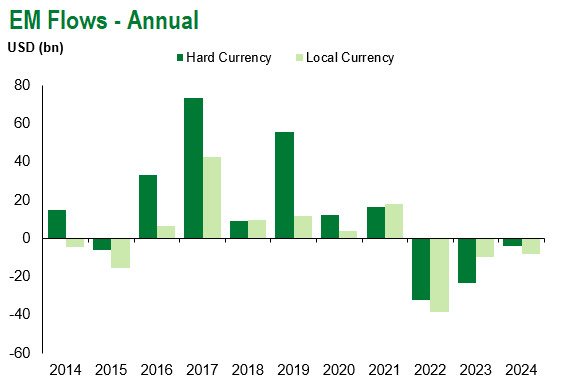
Source for graphs: Bloomberg, JPMorgan, Gramercy. As of July 12, 2024.
For questions, please contact:
Kathryn Exum, CFA ESG, Director, Co-Head of Sovereign Research, [email protected]
Petar Atanasov, Director, Co-Head of Sovereign Research, [email protected]
James Barry, Director, Deputy Portfolio Manager, [email protected]
This document is for informational purposes only. The information presented is not intended to be relied upon as a forecast, research or investment advice, and is not a recommendation, offer or solicitation to buy or sell any securities or to adopt any investment strategy. Gramercy may have current investment positions in the securities or sovereigns mentioned above. The information and opinions contained in this paper are as of the date of initial publication, derived from proprietary and nonproprietary sources deemed by Gramercy to be reliable, are not necessarily all-inclusive and are not guaranteed as to accuracy. This paper may contain “forward-looking” information that is not purely historical in nature. Such information may include, among other things, projections and forecasts. There is no guarantee that any forecasts made will come to pass. Reliance upon information in this paper is at the sole discretion of the reader. You should not rely on this presentation as the basis upon which to make an investment decision. Investment involves risk. There can be no assurance that investment objectives will be achieved. Investors must be prepared to bear the risk of a total loss of their investment. These risks are often heightened for investments in emerging/developing markets or smaller capital markets. International investing involves risks, including risks related to foreign currency, limited liquidity, less government regulation, and the possibility of substantial volatility due to adverse political, economic or other developments. References to any indices are for informational and general comparative purposes only. The performance data of various indices mentioned in this update are updated and released on a periodic basis before finalization. The performance data of various indices presented herein was current as of the date of the presentation. Please refer to data returns of the separate indices if you desire additional or updated information. Indices are unmanaged, and their performance results do not reflect the impact of fees, expenses, or taxes that may be incurred through an investment with Gramercy. Returns for indices assume dividend reinvestment. An investment cannot be made directly in an index. Accordingly, comparing results shown to those of such indices may be of limited use. The information provided herein is neither tax nor legal advice. Investors should speak to their tax professional for specific information regarding their tax situation.
